| 22 October |
• yesterday • tomorrow |
| Optional Memorial of Saint John Paul II, Pope |
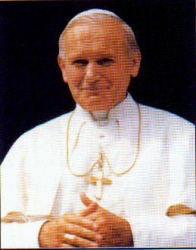
• Karol Wojtyla
• Juan Pablo II
• John Paul the Great
For many years Karol believed God was calling him to the priesthood, and after surviving two nearly fatal accidents, he responded to the call. He studied secretly during the German occupation of Poland, and was ordained on 1 November 1946. In these years he came to know and practice the teachings of Saint Louis Marie Montfort and Saint John of the Cross. Earned his Doctorate in theology in 1948 at the Angelicum in Rome, Italy.
Parish priest in the Krakow diocese from 1948 to 1951. Studied philosophy at the Jagiellonian University at Krakow. Taught social ethics at the Krakow Seminary from 1952 to 1958. In 1956 he became a professor at the University of Lublin. Venerable Pope Pius XII appointed Wojtyla an auxiliary bishop in Krakow on 4 July 1958. Servant of God, Pope Paul VI appointed him Archbishop of Krakow on 30 December 1963.
Wojtyla proved himself a noble and trustworthy pastor in the face of Communist persecution. A member of the prepatory commission, he attended all four sessions of Vatican II; is said to have written Gaudium et spes, the document on the Church in the Modern World. He also played a prominent role in the formulation of the Declaration on Religious Freedom. Following the Council, Pope Paul VI, appointed Karol Wojtyla cardinal on 26 June 1967.
In 1960 he published Love and Responsibility. Pope Paul VI, delighted with its apologetical defense of the traditional Catholic teaching of marriage, relied extensively on Archbishop Wojytla's counsel in writing Humanae Vitae. In 1976 he was invited by Pope Paul VI to preach the lenten sermons to the members of the Papal Household.
In 1978, Archbishop Wojtyla became the first non-Italian pope since Adrian VI. He took the name of his predecessors (John, Paul, John Paul) to emphasize his desire to continue the reforms of Vatican II.
John Paul II is the most traveled pope in history, having visited nearly every country in the world which would receive him. As the Vicar of Christ he has consecrated each place that he has visited to the Blessed Virgin Mary. On 13 May 1983 he went to Fatima to consecrate the world to the Immaculate Heart of Mary. He later repeated the consecration of the world to Mary in union with all the Bishops of the Catholic Church, in fulfillment of Our Lady's promises at Fatima.
In 1995, Pope John Paul II began a lengthy catechisis on the Blessed Virgin Mary during his weekly Angelus addresses, culminating with his instruction on Our Lady's active participation in the Sacrifice of Calvary. This active participation of Our Lady at Calvary is called the co-redemption. Already in 1982 and 1985 he had used the term "corredemptrix" in reference to Our Lady in public addresses. This is significant, for he is the first Pope to do so since Pope Benedict XV at whose prayer Our Lady came to Fatima to reveal Her Immaculate Heart. Since the time of Pope Benedict XV, this terminology was under review by the Holy See; the present Pope's usage is a confirmation of this traditional view of Mary's role in salvation history.
18 May 1920 as Karol Wojtyla at Wadowice, Poland
16 October 1978
2 April 2005 at Rome, Italy of natural causes
• 1 May 2011 by Pope Benedict XVI at Rome, Italy
• the beatification miracle involved the cure from Parkinson's disease of a man in France
• 27 April 2014 by Pope Francis
• the canonization miracle involved the healing of a Costa Rican woman who suffered from a brain aneurysm
• World Meeting of Families 2015
• World Youth Days
O Blessed Trinity, we thank you for having graced the church with Pope John Paul II and for allowing the tenderness of your fatherly care, the glory of the cross of Christ, and the splendor of the Holy Spirit, to shine through him. Trusting fully in your infinite mercy and in the maternal intercession of Mary, he has given us a living image of Jesus the Good Shepherd, and has shown us that holiness is the necessary measure of ordinary Christian life and is the way of achieving eternal communion with you. Grant us, by his intercession, and according to your will, the graces we implore, hoping that he will soon be numbered among your saints. Amen. - official prayer to ask favors through the intercession Pope John Paul II
God is always on the side of the suffering. His omnipotence is manifested precisely in the fact that he freely accepted suffering. He could have chosen not to do so. He could have chosen to demonstrate his omnipotence even at the moment of the Crucifixion. In fact, it was proposed to him:
"Let the Messiah, the King of Israel come down now from the cross that we may see and believe." (Mark 15.32)
But he did not accept that challenge. The fact that he stayed on the Cross until the end, the fact that on the Cross he could say, as do all who suffer,
"My God, my God, why have you forsaken me?" (Mark 15.34)
If the agony on the Cross had not happened, the truth that God is Love would have been unfounded. Yes! God is Love and precisely for this he gave his Son, to reveal himself completely as Love. Christ is the One who "loved...to the end." (John 13.1) "To the end" means to the last breath. - Pope John Paul II from Crossing The Threshold of Hope
To save means to liberate from evil. This does not refer only to social evils, such as injustice, coercion, exploitation. Nor does it refer only to disease, catasrophes, natural cataclysms, and everything that has been considered disaster in the history of humanity. To save means to liberate from radical, ultimate evil. Death itself is no longer that kind of evil, if followed by the Resurrection. And the Resurrection comes about through the work of Christ. Through the work of the Reddemer death ceases to be an ultimate evil; it becomes subject to the power of life. The world does no have such power. The world, which is capable of perfecting therapeutic techniques in various fields, does not have the power to liberate man from death. And therefore the world cannot be a source of salvation for man. Only God saves, and He saves the whole of humanity in Christ. - Pope John Paul II, from Crossing the Threshold of Hope
The essential usefulness of faith consists in the fact that, through faith, man achieves the good of his rational nature. And he achieves it by giving his response to God, as is his duty - a duty not only to God, but to himself. Christ did everything in order to convince us of the importance of this response. Man is called upon to give this response with inner freedom so that it will radiate that veritatis splendor (splendor of truth) so essential to human dignity. Christ wants to awaken faith in human hearts. He wants them to respond to the word of the Father, but he wants this in full respect for human dignity. In the very search for faith an implicit faith is already present, and therefore the necessary condition for salvation is already satisfied. - Pope John Paul II, from Crossing the Threshold of Hope
What emanates from the figure of Saint Joseph is faith...Joseph of Nazareth is a "just man" because he totally "lives by faith." He is holy because his faith is truly heroic. Sacred Scripture says little of him. It does not record even one word spoken by Joseph, the carpenter of Nazareth. And yet, even without words, he shows the depth of his faith, his greatness. Saint Joseph is a man of great spirit. He is great in faith, not because he speaks his own words, but above all because he listens to the words of the Living God. He listens in silence. And his heart ceaselessly perseveres in the readiness to accept the Truth contained in the word of the Living God. We see how the word of the Living God penetrates deeply into the sould of that man, that just man. And we, do we know how to listen to the word of God? Do we know how to absorb it into the depths of our human personalities? Do we open our conscience in the presend of this word? - Pope John Paul II from Daily Meditations
On my pastoral journeys around the world I always try to meet representatives of the Jewish community. But a truly exceptional experience for me was cartainly my visit to the synagogue of Rome. The history of the Jews in Rome is a unique chapter in the history of the Jewish people, a chapter closely linked for that matter to The Acts of the Apostles. During that memorable visit, I spoke of the Jews as our elder brothers in the faith. These words were an expression both of the Vatican Council's teaching and a profound conviction of the part of the Church.... The New Convent has its roots in the old. The time when the people of the Old Covenant will be able to see themselves as part of the New is a question to be left to the Holy Spirit. We, as human beings, try only not to put obstacles in the way. Forgive us, Lord, when we fail to foster genuine understanding between Christians and Jews. - Pope John Paul II, from Crossing the Threshold of Hope
Many people today are disoriented and lost in search of genuine fellowship. Often their lives are either too superficial or shattered by brokenness. Their work often is dehumanizing. They long for an experience of genuine encounter with others, for true fellowship. Well, is this not precisely the vocation of a parish? Are we not called to be a warm, brotherly family together? Are we not people united together in the household of God through our common life? Your parish is not mainly a structure, a geographical area or a building. The parish is first and foremost a community of the faithful. This is the task of a parish today: to be a community, to rediscover its identity as a community. You are not a Christian all by yourself. To be a Christian means to believe and to live one's faith together with others. For we are all members of the body of Christ.... For fellowship to grow, the priest's role is not enough, even though he plays an essential role. The commitment of all parishioners is needed. Each of their contributions is vital. - Pope John Paul II from Draw Near to God
https://catholicsaints.info/pope-saint-john-paul-ii/
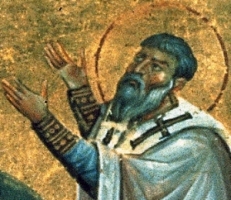
• Abercius of Geropoli
• Abercius of Hieropolis
Resident of Phrygia Salutaris. Bishop of Hierapolis (an area of modern southwestern Turkey). Active missionary in his region. He was imprisoned for a period as a threat to civil order for opposing paganism. At age 72 he was summoned to Rome, Italy to exorcise a demon from Lucilla, daughter of Emperor Marcus Aurelius; he succeeded, and then returned to his see. He composed his own epitaph, making references of traditions still practised today.
A Greek hagiographer used the exorcism incident as a jumping off point to write a biography of Abercius. Lacking material and details, the writer included incidents from the lives of other saints, and when that ran out, he added plain fiction. Some have considered Abercius to be fictional, and much scholarship has been required to prove his existence and extract the few facts about him that we know.
c.200 of natural causes
• Pre-Congregation
• venerated by the Greek Church since the 10th century
• Apollo
• bishop destroying a statue of Apollo
• crozier
• performing an excorcism on a girl or young woman
• with his crozier brought to him by an angel
https://catholicsaints.info/saint-abercius-marcellus/

Mallone, Mallonous, Melanius, Mello, Mellonin, Mellouns, Mellonius
A pagan, Mellon travelled to Rome, Italy to bring tribute to the emperor from the British Isles. While making a sacrifice to the god Mars, he heard Pope Saint Stephen I preaching nearby. He soon after converted to Christianity, and was baptized by Stephen. He sold his property, gave it to the poor, studied further, and was ordained. He and Pope Stephen received a vision of an angel telling Mellon to evangelize the area of Rouen in modern France. First bishop of Rouen. Healer and miracle worker.
• near Cardiff, Wales
• the district is now called Saint Mellon's
11 November 314 of natural causes
Mellonin take this staff, under the which thou shalt rule and govern the city of Rouen, for all the people there is of God, and all ready to thy service and commandment, and, notwithstanding that it is far from hence, and that the way is to thee right grievable, because thou knowest not the country, nevertheless thou oughtest not to doubt no thing, for Jesu Christ shall ever keep thee under the shadow of his wings. - an unnamed angel to Saint Mellon, as described in The Golden Legend
https://catholicsaints.info/saint-mellon/
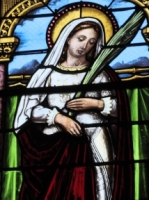
Sister of Saint Nunilo of Huesca, she was born to a Muslim father and Christian mother, and was raised Christian. When her father died, her mother married another Muslim man who persecuted the girls, imprisoned them, and turned them over to die during the persecution of Abdur Rahman II. Martyr.
Huesca, Spain
beheaded at Huesca, Spain in 851
• child abuse victims
• martyrs
• people ridiculed for their piety
• runaways
• unmarried lay-women
https://catholicsaints.info/saint-alodia-of-huesca/

Sister of Saint Alodia of Huesca, she was born to a Muslim father and Christian mother, and was raised Christian. When her father died, her mother married another Muslim man who persecuted the girls, imprisoned them, and turned them over to die during the persecution of Abdur Rahman II. Martyr.
Huesca, Spain
beheaded at Huesca, Spain in 851
• child abuse victims
• martyrs
• people ridiculed for their piety
• runaways
• unmarried lay-women
https://catholicsaints.info/saint-nunilo-of-huesca/

• Esclaramunda of Foix
• Esclarmonde, Esclarmonda
Daughter of Count Roger IV of Foix and Brunisenda Cardona. Queen of Majorca, married to King James II of Majorca (in modern Spain) on 1 September 1275. Joined the Mercedarians at San Pedro de Amer in 1291, and became a great protector and benefactor of the Order.
1255
1315 in Perpignan, Spain of natural causes
crown, scepter
https://catholicsaints.info/blessed-esclaramunda-of-majorca/
Monk. Abbot of the Basilica of Saint-Privat-de-Javols, Chalons, Neustria (in modern France). Tortured and murdered when falsely accused of criticizing Queen Brunechilde.
• beheaded c.584 at Ponthion sur Vitry-le-Francois, Marne, France
• head and body thrown into the river Marne
• body secretly recovered and given proper burial
• his grave became known for miraculous healing
• re-interred in the cathedral of Soissons, France, date unknown
• relics destroyed with the cathedral caught fire in 1667
children
https://catholicsaints.info/saint-lupenzius/
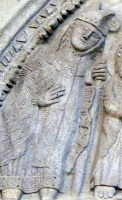
• Moderan of Berceto
• Moderamnus, Moderanno, Moderano, Modran, Moran
Benedictine, monk. Bishop of Rennes, France in 703. Pilgrim to Rome, Italy in 720. In his later years he resigned his see to become a hermit monk at the abbey of Berceto, Italy.
Rennes, France
• c.730 at Parma, Italy of natural causes
• relics enshrined in Rennes, France
Berceto, Italy
https://catholicsaints.info/saint-moderan-of-rennes/
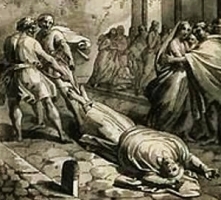
Filippo
Deacon to Saint Hermes of Adrianople. During the persecutions of Diocletian, Saint Hermes and Saint Philip were ordered by governor Basso to close their church and turn over all scriptures and other documents, and all altar furnishings. When Hermes explained that he had no authority to do so, the two were imprisoned, flogged and executed. Martyr.
burned to death in Adrianople, Thrace
https://catholicsaints.info/saint-philip-of-adrianople/

• Benedict of Massérac
• Benito...
Monk. Abbot at Petras. Hermit at Macerac, diocese of Nantes, France. His holiness and wisdom attacted so many spiritual students that he founded a Columban monastery for them.
Greece
• 845 in the diocese of Nantes, Brittany (in modern France)
• relics enshrined at the abbey of Redon
https://catholicsaints.info/saint-benedict-of-macerac/
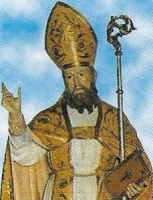
Símaco, Simbrico, Simmaco, Simmio, Simo
Born to a distinguished imperial Roman senatorial family. Bishop of Capua, Italy in 430. Founded the basilica of Santa Maria Maggiore which survived the Saracens invasion and became the core of the rebuilt city.
late 4th century
c.449 of natural causes
Santa Maria Capua Vetere, Italy
https://catholicsaints.info/saint-symmachus-of-capua/
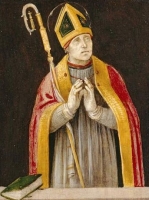
Donat, Donagh
Pious and well-educated poet and scholar. While on pilgrimage to Rome, Italy in 816 with Andrew the Scot he was stopped in Tuscany and was compelled to become bishop of Fiesoli, Italy. Known his solicitous hospitality to pilgrims.
Irish
874
https://catholicsaints.info/saint-donatus-of-fiesoli/

Born to the royal house of France. Monk at Monte Cassino Abbey. Abbot there in 856. Murdered by invading Saracens while at prayer. Martyr.
c.810
22 October 823 at Monte Cassino Abbey in Italy
26 August 1727 by Pope Benedict XIII (cultus confirmation)
https://catholicsaints.info/saint-bertharius-of-monte-cassino/
Ermete
Bishop of Heraclea. During the persecutions of Diocletian, Saint Hermes and Saint Philip were ordered by governor Basso to close their church and turn over all scriptures and other documents, and all altar furnishings. When Hermes explained that he had no authority to do so, the two were imprisoned, flogged and executed. Martyr.
burned to death in Adrianople, Thrace
https://catholicsaints.info/saint-hermes-of-adrianople/
Leotaldo, Léothade
Born to the Frankish nobility. Monk. Abbot of Moissac Abbey in France in 670. Bishop of Auch, France in 691. KDied while travelling as part of a delegation to Charles Martel.
7th century Gaul (in modern France)
• 718 in Burgundy (in modern France of natural causes
• relics enshrined in the cathedral of Auch, France
https://catholicsaints.info/saint-leothadius-of-auch/
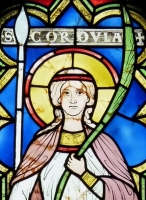
Kordula
One of the companions of Saint Ursula. When she saw the tortures being inflicted on her friends, she hid, but the next day, ashamed of her cowardice, she came out of hiding and proclaimed her Christianity. Martyr, the last of the group.
453 in Cologne, Germany
https://catholicsaints.info/saint-cordula/
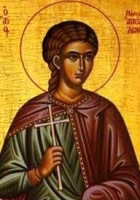
Hermit in Thebes in Egypt for 40 years. Monk. Abbot of Bawit in Hermopolis, a house of 500 monks. Left the monastic life to oppose the decrees of Julian the Apostate.
316 in Egypt
395 of natural causes
https://catholicsaints.info/saint-apollo-of-bawit/
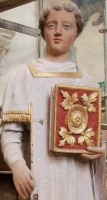
Deacon in the early Church in the area of Langres, France. Worked with Saint Desiderius of Langres. Martyred by area pagans.
beheaded on 22 October 411 near Besancon, France
https://catholicsaints.info/saint-valerius-of-langres/
Ingebert, Ingobert, Ingobertus
Hermit near modern Saint Ingbert, Saarland, Germany, a town named for him.
c.650 of natural causes
hermit with a cross in front of a cave
https://catholicsaints.info/saint-ingbert/
Soldier who witnessed the martyrdom of Saint Alexander and companions, and was so moved, he converted and died with them. Martyr.
beheaded
https://catholicsaints.info/saint-heraclius-the-martyr-22-october/
Nancto, Noint, Nuncto
Monk. Abbot of a monastery near Mérida, Spain. Murdered by robbers of his house. Martyr.
668
https://catholicsaints.info/saint-nunctus-of-merida/
Bishop of Fermo, Italy. Martyred in the persecutions of Aurelian.
• c.270 in Fermo, Italy
• relics enshrine in the cathedral of Fermo, Italy
https://catholicsaints.info/saint-philip-of-fermo/
Missionary bishop in imperial Rome. Ordered to sacrifice to pagan idols, he refused. Martyr.
beheaded
https://catholicsaints.info/saint-alexander-the-martyr-22-october/
Monk at Bobbio, Italy. Founded Precipiano Abbey near Tortona, Italy.
c.650
https://catholicsaints.info/saint-maroveus-of-precipiano/
First Gentile bishop of Jerusalem c.135, serving for over 20 years. Martyr.
156
https://catholicsaints.info/saint-mark-of-jerusalem/
Bishop of Clermont, France in 386.
c.388
https://catholicsaints.info/saint-nepotian-of-clermont/
Bishop of Verona, Italy.
522
https://catholicsaints.info/saint-verecundus-of-verona/
An ascetic hermit in the desert of 5th century Egypt.
https://catholicsaints.info/saint-rufus-of-egypt/
A group of four clerics in Heraclea (modern Marmara Ereglisi, Turkey) who were arrested in the persecutions of Diocletian. They were imprisoned, abused and ordered to turn over all the scriptures that they had hidden from authorities; they refused, and were executed together. Martyrs. - Eusebius, Hermes, Philip and Severus.
burned at the stake in 304 in Adrianople (modern Edirne, Turkey)
https://catholicsaints.info/martyrs-of-heraclea/
Thousands of people were murdered in the anti-Catholic persecutions of the Spanish Civil War from 1934 to 1939. I have pages on each of them, but in most cases I have only found very minimal information. They are available on the CatholicSaints.Info site through these links:
• Blessed Estanislao García Obeso
• Blessed Germán Caballero Atienza
• Blessed José Menéndez García
• Blessed Josep Casas Lluch
• Blessed Luis Minguel Ferrer
• Blessed Victoriano Ibañez Alonso
• Lucia Bartolini Rucellai
CatholicSaints.Info Portable Edition